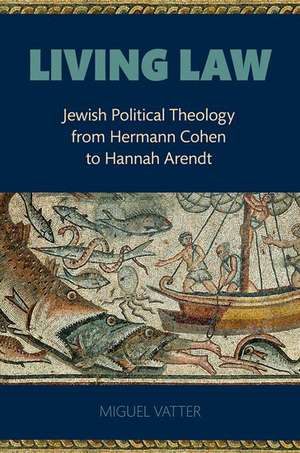Living Law: Jewish Political Theology from Hermann Cohen to Hannah Arendt
Autor Miguel Vatteren Limba Engleză Hardback – 31 mar 2021
Preț: 482.71 lei
Preț vechi: 529.36 lei
-9% Nou
Puncte Express: 724
Preț estimativ în valută:
92.38€ • 100.31$ • 77.60£
92.38€ • 100.31$ • 77.60£
Carte disponibilă
Livrare economică 22-28 martie
Preluare comenzi: 021 569.72.76
Specificații
ISBN-13: 9780197546505
ISBN-10: 0197546501
Pagini: 360
Dimensiuni: 155 x 236 x 31 mm
Greutate: 0.66 kg
Editura: Oxford University Press
Colecția OUP USA
Locul publicării:New York, United States
ISBN-10: 0197546501
Pagini: 360
Dimensiuni: 155 x 236 x 31 mm
Greutate: 0.66 kg
Editura: Oxford University Press
Colecția OUP USA
Locul publicării:New York, United States
Recenzii
Ingenious and original.
An erudite and comprehensive work that finally offers an account of Jewish political theology in distinctive and refreshing ways. Vatter's thought moves both historically and conceptually with great care and precision. Through a wide range of sources and in light of heterodox Jewish religious and philosophical writings, he argues that Jewish political theology is wrought from textual, conceptual, and mystical traditions. The ideas of divine sovereignty and divine governments offer another path toward understanding political theology, departing from Schmitt and contextualizing his contributions in light of a substantial legacy of Jewish political thought.
Vatter's book is not merely about Jewish political theology, it is a bold and powerful intervention in the uniquely Jewish fusion of the ideas of divine sovereignty and individual human dignity. For Vatter, to put it simply, Jewish political theology expounds the biblical verse, 'Let us make the human in our image.' Vatter offers a profound and provocative meditation on the way that Jewish political thought, from Philo to Hannah Arendt, aspires to make this biblical verse into the first principle of a free people's democratic constitution.
In this gripping work, Miguel Vatter traces the genesis of a distinctively Jewish political theology. Drawing on vast reserves of erudition, Vatter shows how the luminaries of German Jewish thought, from Cohen to Arendt, developed a notion of 'living law' directly opposed to the authoritarian tenor of political theology as practiced by Carl Schmitt. This careful historical work allows Vatter to advance a provocative theoretical claim: theocracy is not synonymous with clerical rule or religious coercion. Rather, in its German-Jewish incarnation, theocracy is radically democratic, modeling a form of political community that is anarchic without being lawless.
Living Law asks if there is such a thing as a Jewish political theory. In this superb book, Miguel Vatter's answer is that there is. Looking at a series of key Jewish political and theological thinkers, Vatter finds that the common thread to these figures is a sense of community that is independent, and even possibly resistant, to states and governments of various sorts. Living Law describes how the Jewish tradition contains inside itself a radical, anarchic kernel, a kind of material practice that permits both vast differences in thought and application even as it also holds that community together. If you want a book that really gets to the bottom of how a theological tradition can translate itself into a set of coherent albeit radically unlike practices, this is the book for you.
An erudite and comprehensive work that finally offers an account of Jewish political theology in distinctive and refreshing ways. Vatter's thought moves both historically and conceptually with great care and precision. Through a wide range of sources and in light of heterodox Jewish religious and philosophical writings, he argues that Jewish political theology is wrought from textual, conceptual, and mystical traditions. The ideas of divine sovereignty and divine governments offer another path toward understanding political theology, departing from Schmitt and contextualizing his contributions in light of a substantial legacy of Jewish political thought.
Vatter's book is not merely about Jewish political theology, it is a bold and powerful intervention in the uniquely Jewish fusion of the ideas of divine sovereignty and individual human dignity. For Vatter, to put it simply, Jewish political theology expounds the biblical verse, 'Let us make the human in our image.' Vatter offers a profound and provocative meditation on the way that Jewish political thought, from Philo to Hannah Arendt, aspires to make this biblical verse into the first principle of a free people's democratic constitution.
In this gripping work, Miguel Vatter traces the genesis of a distinctively Jewish political theology. Drawing on vast reserves of erudition, Vatter shows how the luminaries of German Jewish thought, from Cohen to Arendt, developed a notion of 'living law' directly opposed to the authoritarian tenor of political theology as practiced by Carl Schmitt. This careful historical work allows Vatter to advance a provocative theoretical claim: theocracy is not synonymous with clerical rule or religious coercion. Rather, in its German-Jewish incarnation, theocracy is radically democratic, modeling a form of political community that is anarchic without being lawless.
Living Law asks if there is such a thing as a Jewish political theory. In this superb book, Miguel Vatter's answer is that there is. Looking at a series of key Jewish political and theological thinkers, Vatter finds that the common thread to these figures is a sense of community that is independent, and even possibly resistant, to states and governments of various sorts. Living Law describes how the Jewish tradition contains inside itself a radical, anarchic kernel, a kind of material practice that permits both vast differences in thought and application even as it also holds that community together. If you want a book that really gets to the bottom of how a theological tradition can translate itself into a set of coherent albeit radically unlike practices, this is the book for you.
Notă biografică
Miguel Vatter is Professor of Politics at Flinders University, Australia. He is author of Divine Democracy: Political Theology after Carl Schmitt and The Republic of the Living: Biopolitics and the Critique of Civil Society.
